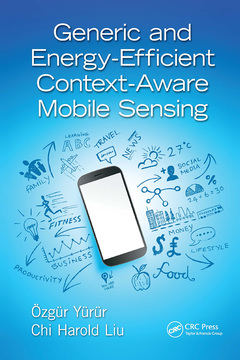Generic and Energy-Efficient Context-Aware Mobile Sensing
Auteurs : Yurur Ozgur, Liu Chi Harold

Elaborating on the concept of context awareness, this book presents up-to-date research and novel framework designs for context-aware mobile sensing. Generic and Energy-Efficient Context-Aware Mobile Sensing proposes novel context-inferring algorithms and generic framework designs that can help readers enhance existing tradeoffs in mobile sensing, especially between accuracy and power consumption.
The book presents solutions that emphasize must-have system characteristics such as energy efficiency, accuracy, robustness, adaptability, time-invariance, and optimal sensor sensing. Numerous application examples guide readers from fundamental concepts to the implementation of context-aware-related algorithms and frameworks.
Covering theory and practical strategies for context awareness in mobile sensing, the book will help readers develop the modeling and analysis skills required to build futuristic context-aware framework designs for resource-constrained platforms.
- Includes best practices for designing and implementing practical context-aware frameworks in ubiquitous/mobile sensing
- Proposes a lightweight online classification method to detect user-centric postural actions
- Examines mobile device-based battery modeling under the scope of battery nonlinearities with respect to variant loads
- Unveils a novel discrete time inhomogeneous hidden semi-Markov model (DT-IHS-MM)-based generic framework to achieve a better realization of HAR-based mobile context awareness
Supplying theory and equation derivations for all the concepts discussed, the book includes design tips for the implementation of smartphone programming as well as pointers on how to make the best use of MATLAB® for the presentation of performance analysis. Coverage includes lightweight, online, and unsupervised pattern recognition methods; adaptive, time-variant, and optimal sensory sampling strategies; and energy-efficient, robust, and inhomogeneous context-aware framework designs.
Researchers will learn the latest modeling and analysis research on mobile sensing. Students will gain access to accessible reference material on mobile sensing theory and practice. Engineers will gain authoritative insights into cutting-edge system designs.
Context Awareness for Mobile Sensing. Context Inference: Posture Detection. Context-Aware Framework: A Basic Design. Energy Efficiency in Physical Hardware. Context-Aware Framework: A Complex Design. Probabilistic Context Modeling.
Ozgur Yurur received a double major from the Department of Electronics Engineering and the Department of Computer Engineering at Gebze Institute of Technology, Kocaeli, Turkey, in 2008, and MSEE and PhD from the Department of Electrical Engineering at the University of South Florida (USF), Tampa, Florida, in 2010 and 2013, respectively. He is currently with RF Micro Devices, responsible for the research and design of new test development strategies and also for the implementation of hardware, software, and firmware solutions for 2G, 3G, 4G, and wireless-based company products. In addition, Dr. Yurur conducts research in the field of mobile sensing. His research area covers ubiquitous sensing, mobile computing, machine learning, and energy-efficient optimal sensing policies in wireless networks. The main focus of his research is on developing and implementing accurate, energy-efficient, predictive, robust, and optimal context-aware algorithms and framework designs on sensor-enabled mobile devices.
Chi Harold Liuis a full professor at the School of Software, Beijing Institute of Technology, China. He is also the deputy director of IBM Mainframe Excellence Center (Beijing), director of IBM Big Data Technology Center, and director of National Laboratory of Data Intelligence for China Light Industry. He holds a PhD from Imperial College, United Kingdom, and a BEng from Tsinghua University, China. Before moving to academia, he joined IBM Research, China, as a staff researcher and project manager and was previously a postdoctoral researcher at Deutsche Telekom Laboratories, Germany, and a visiting scholar at IBM T. J. Watson Research Center, Armonk, New York. Dr. Liu’s current research interests include the Internet of Things (IoT), big data analytics, mobile computing, and wireless ad hoc, sensor, and mesh networks. He received the IBM First Plateau Invention Achievement Award in 2012 and an IBM First Patent Applicati
Date de parution : 01-2024
15.6x23.4 cm
Date de parution : 01-2015
Ouvrage de 221 p.
15.6x23.4 cm
Thèmes de Generic and Energy-Efficient Context-Aware Mobile Sensing :
Mots-clés :
Power Consumption; User State; Context Awareness for Mobile Sensing; Context Aware Applications; Context Inference; User State Transition; Context-Aware Framework; Entropy Rate; Energy Efficiency in Physical Hardware; Sensory Operation; Probabilistic Context Modeling; Data Set; Accelerometer Sensor; Power Consumption Ratio; IDD; Context Aware Middleware; Proposed Classification Method; Gps Trace; Sensor Management System; Training Data Classes; Euclidean Distance Analysis; Battery Behavior; Existing Classification Methods; Feature Vector; Battery Lifetime; Belief Vector; Current User State; Electrical Circuit Models; Duty Cycling



